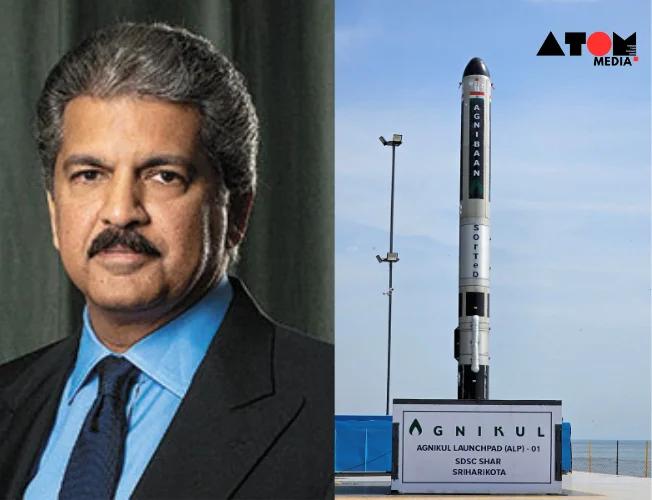Anand Mahindra, a prominent figure in the Indian economy, declared his investment in Agnikul Cosmos, a private space startup generating significant buzz in the sector. This information comes after Agnikul launched Agnibaan SOrTeD—the first rocket in history to use a fully 3D-printed engine—successfully. The launch, which happened on May 30, 2024, was a big step toward India’s space goals.
Agnibaan Takes Flight
The Agnibaan SOrTeD is a two-stage rocket capable of reaching 700 km in altitude with a 300 kilogram payload. Its engines work on a reliable combination of liquid oxygen and kerosene propellant. Interestingly, the launch was carried out from Dhanush, India’s first privately built launchpad. It’s located inside ISRO’s Sriharikota rocket port in Andhra Pradesh.
Anand Mahindra Hails Young Talent and Innovation
Mahindra showed his excitement with the accomplishment by endorsing Agnikul Cosmos on the social media site X.com. He wrote, “You’ll see a rocket lifting off.” “You’ll also see the talent of young Indians lifting off…” He revealed his investment status with Agnikul Cosmos and used the hashtag #MondayMotivation, underscoring his conviction in the company’s potential.
Agnibaan SOrTeD: A Showcase of Technological Advancements
Agnikul Cosmos, incubated at the prestigious Indian Institute of Technology Madras (IIT Madras), has made significant strides in developing indigenous space technologies. The Agnibaan SOrTeD boasts several impressive features, including:
- Fully 3D-Printed Engine: This groundbreaking technology represents a significant advancement in rocket engine manufacturing, offering advantages such as reduced weight, faster production times, and potentially lower costs.
- In-House Developed Flight Control Systems: Agnikul Cosmos designed and built the data acquisition systems and flight computers used in the Agnibaan, showcasing their engineering capabilities and commitment to self-reliance.
- Precise Flight Control: The launch achieved a “controlled ascent with full 3-axis control,” demonstrating the effectiveness of the in-house developed autopilot system. The engine burn time also matched expectations, lasting for 65 seconds.
- Linux-Powered Launch Platform: Agnibaan marked a first for India by utilizing computers operating on the Linux operating system for launch control. This move signifies a potential shift towards more open-source solutions in the Indian space industry.
- Ethernet-Based Architecture: The Agnibaan employed an ethernet-based architecture for communication between onboard flight computers, a reliable and efficient approach to internal data transmission.
- Sustainable Propellant Choices: The launch vehicle utilized a combination of aviation-grade jet fuel and industrial-grade liquid oxygen, offering a potentially more sustainable alternative to traditional rocket propellants.
Agnikul Cosmos: Setting Sights on Orbit
With the successful launch of Agnibaan SOrTeD, Agnikul Cosmos has established itself as a key player in India’s burgeoning private space sector. The company is now setting its sights on even more ambitious goals, aiming to conduct an orbital mission by 2025. This mission would represent a significant leap forward in India’s spacefaring capabilities and further demonstrate the potential of domestic private space companies.
A Thriving Indian Space Ecosystem
The success of Agnikul Cosmos and Mahindra’s investment demonstrate the growing momentum in India’s commercial space industry. With a combination of new startups, established industry players such as Mahindra, and continuing government support, India’s space sector is expected to grow significantly in the future years. This expansion aims to not only strengthen India’s scientific and technological capability, but also to create high-skilled jobs and develop new space-based applications for a variety of industries.
Space Exploration for Everyone: A New Era for India
The private space industry has the ability to democratize access to space by making it more inexpensive and available to a broader variety of stakeholders. This could result in the creation of new technology, applications, and services that benefit not only the space sector but society as a whole. As firms like Agnikul Cosmos continue to push the frontiers, India can look forward to a bright future in space exploration, with both established organizations and new entrepreneurs playing important roles.
Read more: Marketing News, Advertising News, PR and Finance News, Digital News





